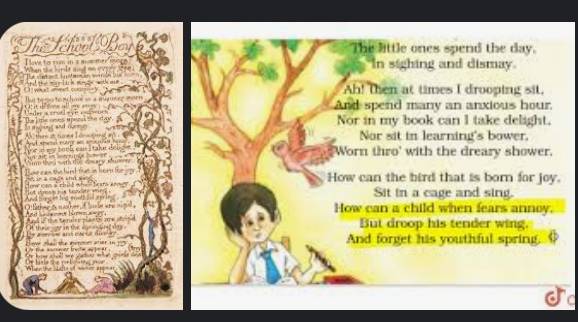The School Boy" is a poem written in the pastoral tradition that focuses on the downsides of formal learning. It considers how going to school on a summer day "drives all joy away".[3] The boy in this poem is more interested in escaping his classroom than he is with anything his teacher is trying to teach. In lines 16–20, a child in school is compared to a bird in a cage.[3] Meaning something that was born to be free and in nature, is instead trapped inside and made to be obedient.
Poem transcription
Wikisource has original text related to this article:
What does it mean?
- First stanza: The school boy wakes and sees the sound of birds pleasant. It seemed to him as if the skylark is singing with him. All of these was such a sweet company to him.
- Second stanza: The school boys spent their days in utter despair under the thread of teacher's presence.
- Stanza three describes school, how when home-schooled you can sit happily and read. At school, there is no freedom; you will learn what you are told to learn, nothing more, nothing less. School cannot delight him.
- Stanza four compares good boy at school to a bird in a cage. A bird can't sing in a cage and also, a child can't be happy in school: his potential is restrained.
- Stanza five shows how people are dismayed at school and how students are stripped of their joy.
- The final stanza describes how school can never be fun, but it is like a cold winter's day blasting through the warm summer.
- In the last two stanzas Blake makes a heartfelt plea to parents using an extended metaphor of the natural cycles of life. In the world of nature, a bud grows into a flowering tree that will bear fruit as it matures. Blake references the seasons, describing how an Autumn harvest of fruit sustains life through the harsh Winter. In this way, he is illustrating how a happy childhood spent learning from the natural world will reap the benefits of a wise and fruitful old age. Sending children to school interferes with this natural cycle and results in a lifetime of unhappiness with no chance of cultivating wisdom.
- He likes the summer morning.
- He doesn't like the school.
- He thinks school is a waste of time.
- He thinks students can't be happy.
- He thinks there is no freedom in the school.
- He thinks students in school are stripped of their joy.
- He thinks school is never fun.




No comments yet
Be the first to share your thoughts!